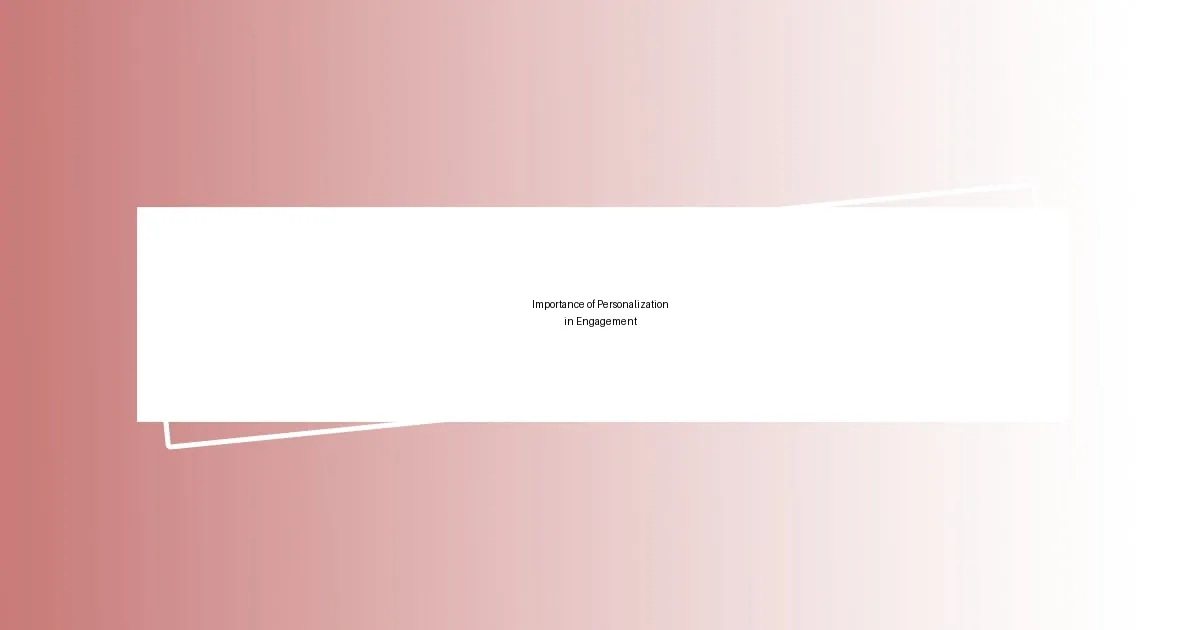Key takeaways:
- Personalization is crucial in guest engagement, creating emotional connections that foster loyalty and memorable experiences.
- Technology, such as mobile apps and chatbots, enhances guest interaction by providing tailored recommendations and immediate support.
- Gathering and acting on guest feedback can lead to significant improvements in satisfaction and loyalty, transforming their experiences.
- Future trends emphasize hyper-personalization and sustainability as key factors that will shape guest engagement strategies.

Understanding Guest Engagement Strategies
When I think about guest engagement strategies, I can’t help but remember the time I attended a small boutique hotel that truly understood this concept. From personalized welcome notes to tailored experiences based on our interests, I felt valued right from the start. Isn’t it fascinating how such simple gestures can build an emotional connection between a venue and its visitors?
Engagement strategies extend beyond just the surface-level experiences; they’re about creating lasting memories. I once visited a restaurant that encouraged diners to share their favorite dish on social media, offering a discount on their next visit. It made me question—how often do businesses tap into their guests’ personal stories? This not only elevated my dining experience but also fostered a community feel among patrons.
I believe that understanding your audience is crucial in crafting effective engagement strategies. For instance, when a hotel staff remembers your name or your favorite drink, it transcends typical customer service interactions. It transforms into a unique bond. How does that shape your perception of a brand? For me, it reinforces loyalty and encourages me to recommend them to friends and family, creating a ripple effect of positive engagement.

Importance of Personalization in Engagement
Personalization in engagement is like a warm hug that makes guests feel seen and appreciated. I remember staying at a charming bed-and-breakfast where the owners took the time to ask about our hobbies during breakfast. Later that day, they suggested local attractions that matched those interests. That thoughtful touch turned a mere stay into a memorable adventure, showcasing how personalization can lead to deeper guest connections.
It’s often the little details that create significant impacts. For example, I once visited a coffee shop that noted my usual order and surprised me with a complimentary pastry during my next visit. This simple act of remembering turned an ordinary coffee run into a delightful experience. It made me think—how can businesses leverage such moments to create lifelong loyal patrons? Personalization not only enhances immediate engagement but also builds lasting relationships with guests.
The emotional weight of personalization cannot be overstated. When guests feel a connection to a brand, they are more likely to share their experiences with others. A friend of mine once shared how a hotel surprised her with a birthday cake in her room after she mentioned her birthday while checking in. Those acts of kindness create stories worth telling, multiplying their effects as guests naturally become brand advocates. Isn’t that the ultimate goal of engagement?
| Personalization Example | Impact on Engagement |
|---|---|
| Welcome notes tailored to guest preferences | Creates an emotional connection and memorable first impression |
| Complimentary items based on previous visits | Encourages repeat visits and builds loyalty |

Utilizing Technology for Better Interaction
Utilizing technology can significantly elevate guest interaction and engagement. I recall visiting a hotel that used a mobile app to streamline check-in and offer personalized recommendations based on my preferences. This seamless integration made me feel like a valued guest, drastically improving my experience. Technology, when thoughtfully applied, can transform ordinary interactions into unique, memorable moments.
Here are some effective ways technology enhances guest interaction:
- Chatbots: Instant support for inquiries, providing immediate assistance without the wait.
- Mobile apps: Customized recommendations and quick access to services, promoting a personalized experience.
- Augmented reality: Engaging guests through immersive experiences, whether it’s virtual tours or interactive dining options.
- Social media platforms: Creating a community feel by encouraging guests to share their experiences, which in turn attracts new visitors.
- Feedback tools: Gathering real-time insights to adapt services and better meet guest expectations.
With these strategies, I’ve found that technology doesn’t just support engagement; it deepens the guest’s connection to the brand.

Creating Memorable Experiences for Guests
Creating memorable experiences for guests goes beyond just the services provided; it’s about crafting moments that resonate. I remember attending a wedding at a picturesque venue where, unexpectedly, the staff learned about the couple’s love for stargazing. Later that evening, they surprised guests with blankets and telescopes set up on the patio, inviting us to connect with the cosmos. That gesture not only made the event unforgettable but also fostered a sense of community among guests. Isn’t it amazing how something thoughtful and unexpected can create such lasting memories?
The atmosphere plays a vital role in guest experiences as well. I once visited a boutique hotel where the lobby was filled with the scent of freshly baked cookies—a sweet welcome that instantly put me at ease. Each evening, they hosted a small gathering that encouraged guests to mingle over local wine and cheese. It made me realize that the right ambiance can transform a simple stay into a delightful gathering. How can businesses create similar immersive experiences that truly engage their guests?
Finally, engaging storytelling is a crucial tool for memorable experiences. I recall visiting a local theater that not only showcased performances but also offered insightful pre-show talks about the production’s background and themes. This approach enriched my understanding and appreciation of the arts, creating a deeper connection to the experience. When guests feel part of a story, it elevates their journey and encourages them to share their tales with others. What stories do you want your guests to remember?

Measuring Engagement Effectiveness
Measuring engagement effectiveness is crucial for aligning strategies with guest expectations. I remember attending a conference where the organizers utilized live polls to gauge attendee satisfaction in real time. This adaptive approach allowed them to pivot quickly and address concerns on the spot, leaving a lasting impression on participants. When we engage guests and simultaneously track their reactions, we can create a feedback loop that truly enhances the guest experience.
Data analysis plays a pivotal role in understanding how well our engagement initiatives are working. For instance, in one of my projects, we analyzed the social media interactions surrounding an event. Not only did we see engagement metrics like likes and shares, but we also noticed how specific content types resonated more with attendees. This analysis helped us tailor future events, ultimately boosting overall satisfaction. Isn’t it fascinating how numbers can tell stories about our guests’ experiences?
I often reflect on the importance of qualitative feedback as well. After a recent event, we sent an open-ended survey to attendees, inviting them to share their thoughts. The stories they provided highlighted key areas for improvement that quantitative data simply couldn’t capture. One particularly touching comment about a guest’s special moment during the event reminded me that behind every number is a story waiting to be told. How do you gather insights that truly reflect your guests’ experiences?

Adapting Strategies Based on Feedback
Adapting strategies based on guest feedback is essential for creating a responsive and engaging environment. When I was part of a small restaurant team, we instituted a feedback card system that encouraged our diners to share their thoughts directly. One evening, a guest noted that the music was a bit loud, which prompted us to adjust the volume. The next day, we received multiple compliments on the improved atmosphere, showing just how impactful one piece of feedback can be. Isn’t it remarkable how a simple change can make such a difference in guest satisfaction?
In my experience, collecting feedback isn’t just about listening—it’s about acting on it. While working on a community event, we noticed low attendance after the initial push. When we asked attendees what would draw them in, it turned out many were seeking more interactive activities. By incorporating their suggestions, we turned the next event into a vibrant affair with workshops and live demonstrations. Listening to guests transformed a dwindling gathering into a celebration. Doesn’t it feel rewarding when guests see their ideas embraced?
Finally, the emotional connection established through feedback can be profound. I remember developing a wellness retreat where participants expressed a desire for more personalized sessions. Taking this to heart, we expanded our offerings based on their input. The gratitude from attendees after receiving tailored experiences was palpable—they felt recognized and valued. This feedback loop fosters loyalty and trust, making guests more likely to return. How often do we truly consider the feelings behind our guests’ feedback?

Future Trends in Guest Engagement
The future of guest engagement is increasingly influenced by technology, particularly artificial intelligence and automation. I recently experimented with a chatbot during a virtual event, and the immediate responses to common questions delighted attendees. This real-time interaction not only made guests feel valued but also freed up our team to focus on more complex queries. Have you considered how AI could help streamline your guest interactions?
Another trend I’m excited about is hyper-personalization, where experiences cater specifically to individual guest preferences. During a recent trip, I was pleasantly surprised when a hotel manager recalled my previous stay’s details, suggesting activities perfectly suited for me. That level of attention creates a sense of belonging that guests cherish. Isn’t it amazing how a tailored experience can transform a visit into something unforgettable?
Looking ahead, sustainability is becoming an essential pillar of guest engagement strategies. I attended a conference where a hotel showcased their eco-friendly initiatives, like sourcing local ingredients for their restaurant. Guests responded positively, feeling they were part of a movement rather than just consumers. How do you think incorporating sustainability can enhance the connection between businesses and their guests in the future?














